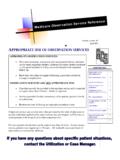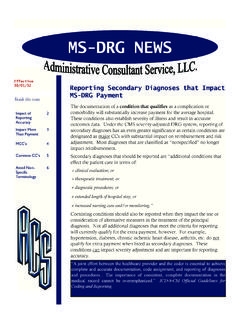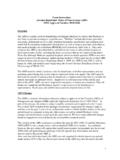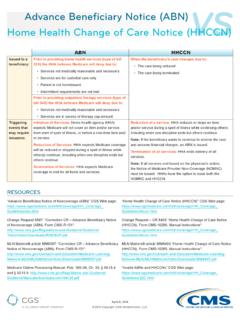Transcription of CMS Guidelines for Advance Beneficiary Notice (ABN)
1 Advance Beneficiary Notice OF NONCOVERAGE care will pay, an ABN should not be given. C. If the physician or sup-plier expects Medicare to deny payment, the next question is: On what basis is denial expected? The physician, supplier or provider must always sub-mit a claim, billing as cov-ered, for an initial determi-nation when it gave an ABN on the basis of the likelihood of denial of pay-ment. On such a claim, the physician, supplier or pro-vider must enter occurrence code 32 on the UB claim in one of the fields numbered 32 through 35. This code indicates the date the physi-cian, supplier or provider gave the ABN to the benefi-ciary. It is the occurrence code 32, and not any condi-tion code that indicates to the FI or MAC that an ABN has been issued.
2 Oc-currence code 32 is manda-tory; it must be used any-time a signed ABN was ob-tained. CMS Guidelines for Advance Beneficiar y Notice (ABN) On Monday, March 3, 2008, CMS implemented use of the revised Advance Beneficiary Notice of Noncoverage (ABN) (CMS-R-131). This form re-places the General Use ABN and the Lab ABN for physician-ordered laboratory tests. The form (English and Spanish ver-sions) and Notice instructions are now posted on the Benefici-ary Notice Initiative web page ( ). When a procedure is re-quested and Medicare may consider the service not medi-cally necessary or reasonable, or diagnosis/sign/symptom is not listed on a Local Cover-age Decision (LCD) or Na-tional Coverage Decision (NCD) then an Advance Beneficiary Notice (ABN) must be signed to protect the provider s right to collect pay-ment from the patient when claims are not reasonable and necessary.
3 Routine, Generic and Blan-ket notices are prohibited by Medicare. By routine we mean giving ABNs to benefi-ciaries where there is no spe-cific, identifiable reason to believe Medicare will not pay. Physicians and suppliers should not give ABNs to beneficiaries unless the physician or supplier has some genuine evidence by their stated reasons for ordering the test. A physi-cian or supplier is prohib-ited from obtaining bene-ficiaries signatures on blank ABNs and then completing the ABNs later. An ABN, to be ef-fective must be completed before treatment delivery to the Beneficiary . Medi-care will hold any ABN that was blank when it was signed to be a defec-tive Notice that will not protect the physician or supplier from liability.
4 Whether an ABN should be given in a particular instance depends on the physician s or supplier s expectation of Medicare payment or denial. A. If the physician or supplier expects Medi-care to pay, an ABN should not be given. B. If the physician or supplier never knows whether or not Medi-A d m i n i s t r a t i v e C o n s u l t a n t S e r v i c e , L L C Inside this issue: Revisions to ABN Guidelines 2 Medical Necessity & ABN s 3 Key Features to the New ABN form 3 Revisions to ABN Guidelines Cont. 4 Sample ABN 5 March 1, 2009 Advance Beneficiary Notice Contact Information: ACS, LLC Box 3368 Shawnee, OK 74802 (405) 878-0118 (405) 878-0411 fax Page 2 Advance Beneficiary Notice of Noncoverage Revised ABN Guidelines Compliance with Limitation On Liability Provisions A healthcare provider (herein referred to as a notifier ) who fails to comply with the ABN in-structions risks financial liability and/or sanctions.
5 LOL provisions shall apply as required by law, regu-lations, rulings and program instructions. Addition-ally, when authorized by law and regulations, sanc-tions under the Conditions of Participation (COPs) may be imposed. The Medicare contractor will hold any provider who either failed to give Notice when required or gave defective Notice financially liable. A notifier who can demonstrate that he or she did not know and could not reasonably have been expected to know that Medicare would not make payment will not be held financially liable for failing to give Notice . However, a notifier who gave defective Notice may not claim that he or she did not know or could not reasonably have been expected to know that Medicare would not make payment as the issuance of defective Notice is clear evidence of knowledge.
6 The Beneficiary is not protected from liability if there is clear evidence that he or she knew that Medicare would not make pay-ment. See for Refund Requirements. ABN Scope The revised ABN is the new CMS-approved written Notice that is issued by providers, practitioners, sup-pliers, and laboratories for items and services pro-vided under Medicare Part A (hospice and regional non-medical healthcare institutes only) and Part B and given to beneficiaries enrolled in the Medicare Fee-For-Service (FFS) program. The revised ABN may not be used for items or services provided under the Medicare Advantage (MA) Program or for pre-scription drugs provided under the Medicare Pre-scription Drug Program (Part D).
7 The revised ABN will now be used to fulfill both mandatory and volun-tary Notice functions. The revised ABN replaces the following no-tices: ABN-G (CMS-R-131-G) ABN-L (CMS-R-131-L) NEMB (CMS-20007) Mandatory ABN Uses The following are statutory provisions requiring deliv-ery of the ABN: 1862(a)(1) of the Act (not reasonable and neces-sary); 1834(a)(17)(B) of the Act (violation of the prohi-bition on unsolicited telephone contacts); 1834(j)(1) of the Act (medical equipment and supplies supplier number requirements not met); 1834(a)(15) of the Act (medical equip-ment and/or supplies denied in Advance ). 1862(a)(9) of the Act (custodial care); 1879(g)(2) of the Act (hospice patient who is not terminally ill).
8 ABN Triggering Events Notifiers are required to issue ABNs whenever limita-tion on liability applies. This typically occurs at three points during a course of treatment which are initia-tion, reduction, and termination, also known as triggering events . Initiations An initiation is the begin-ning of a new patient encounter, start of a plan of care, or beginning of treatment. If a notifier believes that certain oth-erwise covered items or services will be noncov-ered ( not reasonable and necessary) at initia-tion, an ABN must be issued prior to the benefi-ciary receiving the non-covered care. Reductions A reduction occurs when there is a decrease in a com-ponent of care ( frequency, duration, etc.)
9 For ex-ample, a Beneficiary is receiving outpatient physical therapy five days a week and wishes to continue ther-apy five days; however, the notifier believes that the Beneficiary s therapy goals can be met with only three days of therapy weekly. This reduction in treatment would trigger the requirement for an ABN. Continue on page 4 Page 3 Advance Beneficiary Notice Noncoverage Medical Necessity and ABN s Some key features of the new form are that it: Has a new official title, the Advance Beneficiary Notice of Noncoverage (ABN) , in order to more clearly convey the purpose of the Notice ; Replaces the ABN-G and ABN-L; May also be used for voluntary notifications, in place of the Notice of Exclusion from Medicare Benefits (NEMB) (CMS Form 20007); Has a mandatory field for cost estimates of the items/services at issue.
10 And Includes a new Beneficiary option, under which an individual may choose to receive an item/service, and pay for it out-of-pocket, rather than have a claim submitted to Medicare. GZ Modifier If the item or services are furnished despite the Beneficiary s refusal to pay. The physi-cian or supplier should file the claim using the GZ Modifier. (As not having obtained a signed ABN) since it was not completed properly by the Beneficiary . Medicare contractors and carriers, along with CMS, have created na-tional and local medical necessity payment edits that can deny cover-age based on diagnoses, procedures, and frequency limitations. Medi-care requires that patients be told in Advance if a service will not be cov-ered, and a signed ABN form al-lows providers to bill patients for these services.








![[HOME] [ABOUT US] [THE SURROGATE] [PROBATE] …](/cache/preview/9/9/4/9/a/2/2/e/thumb-9949a22ea74d124ecdeba7399ac10967.jpg)